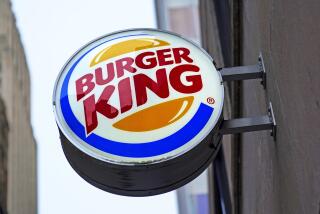Cigarette Firms Tell Jury Charges Can’t Be Proved
- Share via
ST. PAUL, Minn. — Two of the nation’s leading cigarette companies issued spirited defenses of the industry Tuesday at a major trial here, contending that the cigarette companies had not engaged in nefarious practices and had spent hundreds of millions of dollars trying to develop a safer cigarette.
David Bernick, lead lawyer for Brown & Williamson, said the plaintiffs--the state of Minnesota and Blue Cross/Blue Shield of Minnesota--will be unable to prove that previous disclosure of the industry’s research on tobacco and health would have caused smokers to change their behavior or prompted the state to change the way it regulated cigarette sales.
In the first such case to go to trial, the plaintiffs are seeking more than $1.7 billion in damages as compensation for funds expended in treating sick smokers. The state is also seeking additional damages for alleged violations of antitrust and consumer protection laws.
Bernick also reiterated the industry’s long-standing position that although scientists have linked smoking to a variety of serious health problems, including lung cancer and heart disease, there is no definitive causal connection between smoking and disease.
The industry position is “not that cigarettes don’t cause disease or that cigarettes aren’t risky, but there are certain areas where gaps remain,” Bernick said. “You can’t use the word ‘causation’ in an absolute and technical sense.”
Tobacco lawyers have successfully used that argument in winning many lawsuits filed against them by individual smokers. He said the position “is not a statement of public health policy.”
Bernick also took issue with the plaintiffs’ contention--and the generally accepted scientific view--that smoking is addictive. And he said much of the industry’s internal research on nicotine, rather than being secret and devious as alleged by plaintiffs’ lawyers, was done in response to research being performed in the wider scientific community.
Bernick’s opening statement echoed decades-old positions on cigarettes and health maintained by the tobacco industry, and seemed at odds with the more conciliatory public tone the industry has taken in support of a proposed $368.5-billion national tobacco settlement pending before Congress.
That precipitated a sharp retort from Minnesota Atty. Gen. Hubert H. Humphrey III.
Noting that CEOs of the nation’s five leading cigarette companies are to testify Thursday in support of the settlement before the House Commerce Committee, Humphrey said:
“If tobacco executives expect anyone to believe that they are changing their deceitful ways, they will admit publicly that nicotine is addictive, that cigarettes cause cancer and that they have marketed their deadly product to kids.”
Industry lawyers have denied all those things in court here the last two days. Although the companies weren’t expected to admit culpability, Humphrey’s remarks were a sharp reminder that a forceful defense in court can have troubling ramifications for the industry in its quest for congressional approval of the settlement. The accord would give it special legal protections--including a bar on future lawsuits of the type Minnesota filed.
Later Tuesday, in his opening statement, R.J. Reynolds Tobacco Co. lawyer Robert Weber challenged the plaintiffs’ contention that the defendants had conspired to keep a safer cigarette from being developed.
If there was a conspiracy, asked Weber, why did the companies make innovations that brought about significant reductions in tar and nicotine over the last three decades? His answer: The cigarette companies were responding to the pressures of a competitive marketplace, not to the government.
Near the end of the day, James Stricker, a lawyer for Liggett Group, which has only a 2% share of the nation’s cigarette market, made a brief opening statement in which he told jurors that “Liggett is different” from the other defendants.
Stricker said that Liggett is the only cigarette maker to admit that smoking is addictive. He also said that Liggett is the only company that has disclosed the ingredients in its products, has turned over all its confidential documents and has no brands that appeal to teenagers. Liggett Chairman Bennett LeBow is scheduled to testify early in the trial and is expected to tell jurors why Liggett has parted company with the other firms.
Last year, Liggett settled with Minnesota and nearly 40 other states that have sued the industry. But the company did not settle with Blue Cross and thus remains a defendant in the case.
More to Read
Sign up for Essential California
The most important California stories and recommendations in your inbox every morning.
You may occasionally receive promotional content from the Los Angeles Times.













